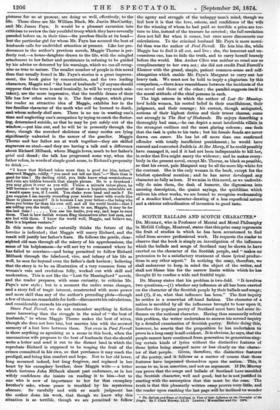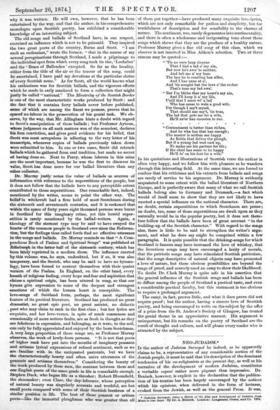SCOTCH BALLADS AND SCOTCH CHARACTER.* DR. MURRAY, who is Professor
of Mental and Moral Philosophy in McGill College, Montreal, states that this prize essay represents the fruit of studies in which he has been accustomed to find• relief from severer professional work. He requests the reader to observe that the book is simply an investigation of the influence which the ballads and songs of Scotland may be shown to have exerted on the character of the Scottish people, and "makes no pretension to be a satisfactory treatment of these lyrical produc- tions in any other aspect." In noticing the essay, therefore, we shall endeavour to keep in mind the object of the writer, and shall not blame him for the narrow limits within which he has thought fit to confine a wide and fruitful topic.
Dr. Murray states that his problem is two-fold. "It involves two questions,—(l) whether any influence at all has been exerted on the character of the Scottish people by their ballads and songs; and (2), if so, what that influence has been." The first inquiry he settles in a somewhat off-hand fashion. The character of a nation is moulded by all the influences brought to bear upon it, therefore the popular poetry of Scotland must have had some in- fluence on the national character. Having thus summarily solved this problem, the writer undertakes to answer his second inquiry by a detailed examination of Scottish poetry. Before doing this, however, he asserts that the proposition he has undertaken to prove in a long essay is self-evident. It is obvious, he says, that the people cannot have continued from generation to generation sing- ing certain kinds of lyrics without the distinctive features of these lyrics being stamped more or less clearly on the charac- ter of that people. Given, therefore, the distinctive features of the poetry, and it follows as a matter of course that those features have impressed themselves upon the nation. This, it seems to us, is an assertion, and not an argument. If Dr. Murray can prove that the songs and ballads of Scotland have moulded the Scottish character, well and good, but he is not justified in starting with the assumption that this must be the case. The truth is that this pleasantly written essay proves very little, and the reader upon reaching the last page .will be inclined to wonder
* The Ballads and Songs of Scotland, in View of their Infinenee on the Character of the People. By J. Clark Murray, LL.D. London: Macmillan and Co. 18r4.
why it was written. He will own, however, that he has been entertained by the way, and that the author, in his comprehensive monologue upon Scottish poetry, has exhibited a considerable knowledge of an interesting subject.
The old songs and ballads of Scotland have, in one respect, exercised an influence which is not to be gainsaid. They inspired the two great poets of the country, Burns and Scott. "I am such an enthusiast," wrote the former, "that in the course of my several peregrinations through Scotland, I made a pilgrimage to the individual spot from which every song took its rise, 'Lochaber' and the Braes of Ballenden ' excepted. So far as the locality, -either from the title of the air or the tenour of the song, could be ascertained, I have paid my devotions at the particular shrine -of every Scottish muse." As for Scott, all the world knows what his enthusiasm was for Scottish ballads, and the vigorous efforts -which he made in early manhood to form a collection that might justly be called" national." The Minstrelsy of the Scottish Border is one of the most characteristic works produced by Scott ; and the fact that it contains forty ballads never before published, -some of which are among the finest we possess, proves that he spared no labour in the prosecution of his genial task. We ob- serve, by the way, that Mr. Allingham hints a doubt with regard to Scott's manipulation of these ballads ; but Professor Aytoun, -whose judgment on all such matters was of the soundest, declares his firm conviction, and gives good evidence for his belief, that Scott was most scrupulous in adhering to the very letter of his transcripts, whenever copies of ballads previously taken down were submitted to him. In one or two cases, Scott' did retouch ballads which he gathered from oral tradition, but made no secret of having done so. Next to Percy, whose labours in this mine are the most important, because he was the first to discover its value, Scott has done more for our ballad literature than any other collector.
Dr. Murray justly notes the value of ballads as sources of information with reference to the superstitions of the people, but it does not follow that the ballads have to any perceptible extent oontributed to those superstitions. One-remarkable fact, indeed; mentioned by the writer, seems to point the other way. The belief in witchcraft had a firm hold of most Scotchmen daring the sixteenth and seventeenth centuries, and it is reckoned that -'within the space of forty years eight thousand persons were burnt in Scotland for this imaginary crime, yet this horrid super- stition is rarely mentioned by the ballad-writers. Again, a theology of the sternest type may be said to have swayed the hearts- of the common people in Scotland ever since the Reforma- tion, but the feelings thus called forth find no effective utterance in the songs and ballads. Dr. Murray reminds us that "A Com- pendious Book of Psalms and Spiritual Songs" was published at Edinburgh in the latter half of the sixteenth century, which has been lately reprinted in a modern dress. The influence exerted by this volume was, he says-, undoubted, but if so, it was also temporary, and the Scotch, who may be said to have no hymno- logy, have been forced to content themselves with their quaint version of the Psalms. In England, on the other hand, every breath of religious feeling, every hope and fear and aspiration that -claims a spiritual origin, has been uttered in song, so that our hymns give expression to some of the deepest and strongest emotions of which the human heart is susceptible. The love-songs of Scotland form, perhaps, the most significant feature of its poetical literature. Scotland has produced no great dramatist, no great epic poet, no great satirist, no didactic , poet who may claim to rank in the first class ; but her lyrics are exquisite, and her love-verses, in spite of much coarseness and -occasionally of more serious faults, are as fresh in thought as they are felicitous in expression, and belonging, as it were, to the soil, can only be fully appreciated and enjoyed by the born Scotclunan. A very large proportion of these songs are, as Professor Murray observes, the work of lowly-born persons. "It is not that poets of higher rank have put into the mouths of imaginary peasants and artisans lyrical expressions of refined sentiment, such as we are familiar with in the antiquated pastorals, but we have the characteristically hearty and often naive utterances of the peasants and artisans themselves." Considering the beauty of the work produced by these men, the contrast between them and our English poets of the same grade in life is remarkable enough. Stephen Duck, who began life as a thresher; Robert Bloomfield, the shoemaker; even Clare, the day-labourer, whose perception of natural beauty was singularly accurate and truthful, are but small poets compared with some of their Scottish brethren of a similar position in life. The best of these peasant or artisan poets—like the immortal ploughman who was greater than all
of them put together—have produced many exquisite love-lyrics, which are not only remarkable for pathos and simplicity, but for truthfulness of description and for sensibility to the charms of nature. The sentiment, too, rarely degenerates into sentimentality, and there is often a wholesome and invigorating tone about these songs which shows that they are the produce of a healthy nature. Professor Murray gives a fine old song of this class, which we observe is not inserted in Miss Aitken's selection. Two or three stanzas may be quoted :—
"Tis no very lang sinsyne
That I had a lad o' my sin, But now he's awa' to anither, And left me a' my lane.
The lass he is courting has siller, And I hae nane at a', And 'tis nought but the love o' the tocher That's tans my lad awa'.
"But I'm blithe that my heart's my am, And I'll keep it a' my life,
Until that I meet wi' a lad Who has sense to wale a good wife. For though I say% mysel, That should nae say% 'tis true, The lad that gets me for a wife, He'll ne'er hae occasion to rue.
"Contentment is bettor than riches, And he wha has that has enough; The master is seldom sae happy As Robin that drives the plough. But if a young lad wad cast up, To make me his partner for life; If the ehiel has sense to be happy He'll fa' on his feet for a wife."
In his quotations and illustrations of Scottish verse the author is often very happy, and we follow him with pleasure as he wanders through this interesting field. At the same time, we are forced to confess that his criticisms and his extracts from ballads and songs are rarely of service to his argument. Dr. Murray is evidently acquainted to some extent with the ballad literature of Northern Europe, and is perfectly aware that many of what we call Scottish ballads belong also to Germany and Denmark,—a fact which would of itself seem to show that they are not likely to have exerted a special influence on the national character. There axe, no doubt, certain superstitions to which Scotchmen are prone; no doubt, too, some of these superstitions are dwelt upon as they naturally would be in the popular poetry,, but it does not there- fore follow that the ballads have been of great account "in the building-up of the Scottish character." With regard to the songs also, there is little to be said to strengthen the writer's argu- ment, and what he does say might be comprised within a few paragraphs. It is quite possible that the drinking-songs for which Scotland is famous may have increased the love of whiskey, that the licentious songs may have encouraged a laxity of morals, that the patriotic songs may have stimulated Scottish patriotism, that the songs descriptive of natural objects may have promoted a love of nature, but these obvious possibilities are beyond the range of proof, and scarcely -need an essay to show their likelihood. No doubt Dr. Clark Murray is quite safe in his assertion that the general influence of the Scottish songs and ballads has been to diffuse among the people of Scotland a poetical taste, and even a considerable poetical faculty, but this statement is too obvious to require a prolonged argument.
The essay, in fact, proves little, and what it does prove did not require proof; but the author, having a sincere love of Scottish poetry, and being encouraged to write on the subject by the offer of a prize from the St. Andrew's Society of Glasgow, has treated the genial theme in an appreciative manner. His argument is unimportant, but his remarks on the poetry of Scotland are the result of thought and culture, and will please every reader who is attracted by the subject.































 Previous page
Previous page